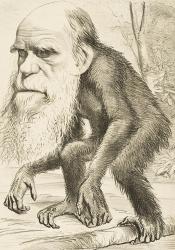On The Origins of Species
The echo of Charles Darwin’s impact on the world is one we still feel today. On November 24th, 1859, Darwin published On the Origin of Species, his documentation of the budding scientific theory of evolution and life’s wide diversity. On the Origin of Species paved the way for scientific breakthroughs and changed Victorians’ views on religion, science, and society.
While the theory of evolution is often attributed singularly to Darwin, these new ideas were not necessarily new in his own lifetime. One of the earliest proponents of evolution was the French naturalist, Jean Baptiste de Lamarck, who “argued that modern animals, including humans, had descended from other species” (Gramlich). Darwin’s own grandfather, Erasmus Darwin, was also a natural philosopher and early proponent of the possibility of transmutation. More importantly, in 1844, Scottish author Robert Chambers (anonymously) published, Vestiges of the Natural History of Creation, which explored transmutation and the (now understood pseudoscience) phrenology. Immediately, Vestiges became a best-seller and extremely controversial. While the novel’s scientific claims do not hold much water today, Darwin himself attributed the novel’s success to preparing English society to accept his own evolutionary theory decades later.
Darwin’s own theories on transmutation and evolution began taking root on a voyage across the globe on a ship called the Beagle. During this voyage, Darwin observed and documented many species and anomalies from rodents in South America to fossils in Africa. He also read Sir Charles Lyell’s “The Principles of Geology” and discovered “the earth’s vast age and how it changed over time” (Gramlich). With this in mind, he became most fascinated by the species of finches on the Galapagos islands and they became the primary focus of his book, On the Origin of Species. There were fourteen different species of Finch on the Galapagos islands and Darwin described how their bills were adapted for the different diets presented on the island. Darwin noted these differences and proposed that all species must have undergone similar transmutations across generations to better survive their individual environments.
What distinguished Darwin’s evolutionary theory from those that preceded him, though, was the fact that he rejected the teleological view of evolution in favor of what he called “natural selection”. Before, scientists attributed any transmutation that occurred in a species was in pursuit of perfection in what was deemed the “Great Chain of Being”. Many also believed that human beings sat separately from other species, according to the Bible’s Genesis. However, Darwin rejected this view and saw no final or perfect destination for evolution. He viewed life as a constant struggle to survive and whoever could reproduce successfully was deemed the “fittest”. This was controversial, because many believed that Darwin’s theory of human evolution was “blasphemous and morally degrading because it contradicted the biblical narrative” (Jonsson 62).
Darwin’s theory of evolution shook Victorian society like an earthquake, his work’s influence far outreaching the span of the scientific and religious communities alone. Immediately following the publication of On the Origin of Species, Darwin’s theories began influencing society and art as well. For example, in 1966, Elizabeth Gaskell designed her character, Roger Hamley, after Darwin in her last (and unfinished) novel, Daughters and Wives, while Thomas Hardy’s novels, Tes of the d’Urbervilles and Jude the Obscure, were set in Darwinian-inspired worlds where the characters had to survive changing social environments. Even today, Darwin’s theory on evolution and natural selection continues to influence society as we examine and question our own prevailing ideas on religion, god, society, and science.
Works Cited
Charles Darwin's Theory of Evolution and the Intellectual Ferment of the Mid- and Late
Victorian Periods, https://www.victorianweb.org/science/darwin/diniejko.html.
Darwin and Evolution, https://victorianweb.org/science/darwin/darwin5.html.
Erasmus Darwin, https://www.victorianweb.org/science/edarwin.html.
Gramlich, Charles A. “On the Origin of Species by Means of Natural Selection by Charles Darwin.” Salem Press Encyclopedia of Literature, June 2019.
Jean Baptiste De Lamarck on Evolution, https://www.victorianweb.org/science/lamarck/2.html.
Jonsson, Emelie. “T. H. Huxley, Arthur Conan Doyle, and the Impact of Evolution on the Human Self-Narrative.” Evolutionary Studies in Imaginative Culture, vol. 2, no. 1, 2018, p. 59.
Robert Chambers (1802-71), https://www.victorianweb.org/science/chambers.html.

